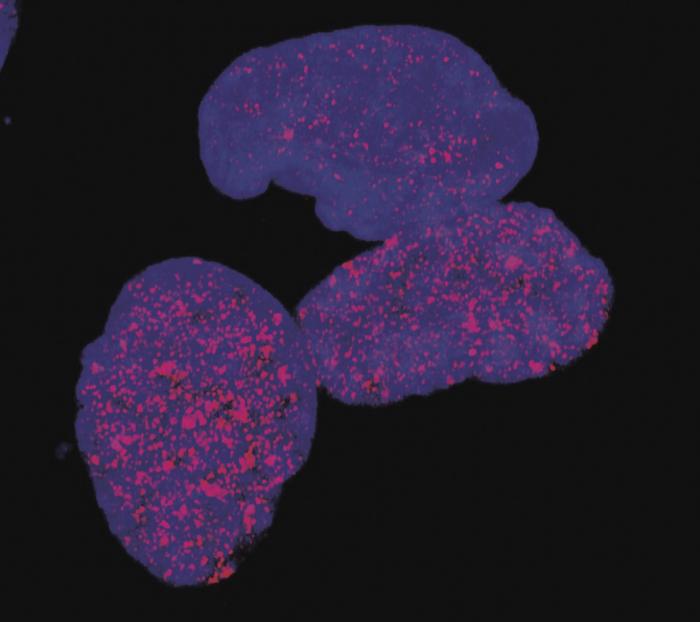
In a remarkable advancement in cancer research, a team at IRB Barcelona led by Dr. Manuel Serrano has uncovered critical insights into the behavior of persister cancer cells, which are responsible for tumor resilience and recurrence even after treatment. This groundbreaking study illuminates the mechanisms behind how these cells evade the immune system and resist traditional therapies, suggesting new pathways for developing more effective treatments.
Cancer can be a devastating illness, and current therapies, including chemotherapy and radiation, often fail to fully eradicate tumors. While some cancer cells enter a state of senescence, characterized by permanent cell cycle arrest and inflammation that can alert the immune system, others adopt a state known as ‘persistence.’ This allows them to temporarily halt their growth, later reactivating and leading to cancer relapse after treatments have completed. Understanding the underlying biology of these persister cells is vital in the ongoing battle against cancer recurrence.
The research, published in the prestigious journal Cancer Research, highlights how persister cells utilize an epigenetic mechanism to block genes associated with inflammation. These genes, when silenced, act like a molecular lock that prevents the immune system from recognizing and attacking the cells. Unlike senescent cells, which exhibit inflammatory characteristics that can draw immune attention, persister cells remain stealthy and capable of renewing their growth once they escape detection.
Dr. Serrano notes the significance of this epigenetic silencing mechanism. It reveals a potential vulnerability of persister cells that could be targeted for therapeutic strategies. By unlocking these blocked inflammatory genes, researchers could create new drugs that specifically target persister cells and enhance the efficacy of existing treatments. Such strategies could drastically alter the trajectory of cancer therapy, particularly for patients confronting treatment-resistant tumors.
The pioneering work led by Dr. Valentina Ramponi involved a series of experiments using selective inhibitors to test the hypothesis that reversing the epigenetic block could compromise the viability of persister cells. The results were promising: inhibiting the silencing mechanism not only unlocked previously untapped inflammatory pathways but also significantly weakened the resilience of persister cells. This discovery opens new doors for designing targeted therapies that could transform the approach to cancer treatment.
As the research community grapples with the growing challenge of cancer treatment resistance, this study’s findings are particularly timely. By focusing on the biology of persister cells, researchers can develop a more nuanced understanding of tumor dynamics, which is essential for devising new therapeutic interventions. The interplay between the immune system and tumor cells is complex, and understanding how to manipulate this relationship could lead to breakthroughs in cancer care.
Moreover, Dr. Ramponi’s perspective as a postdoctoral researcher reinforces the importance of collaborative research. The study was conducted in partnership with several esteemed institutions, including Rovira i Virgili University and the Queen Mary University of London. Such collaborations underscore the collective effort required to tackle multifaceted scientific challenges like cancer.
Funding from notable organizations, including the European Research Council and the Spanish Association Against Cancer, highlights the necessity of financial support for groundbreaking research endeavors. Without such investment, discoveries that have the potential to save lives might remain out of reach.
As this research evolves, the potential implications for clinical practice become increasingly apparent. If new drugs can effectively target persister cells, patients with advanced cancers may experience improved prognoses and reduced chances of relapse. This shift could meaningfully change the landscape of oncology, where precision medicine tailored to individual tumor profiles becomes a standard practice rather than an exception.
Additionally, the research bridges a critical gap in current oncological knowledge. While the presence of persister cells has been acknowledged, their specific pathways of evasion and survival have remained enigmatic. This study elucidates those mechanisms, paving the way for novel therapeutic strategies directly aimed at combatting the properties of these resilient cells.
The ongoing fight against cancer necessitates continual exploration and understanding of cellular behavior in response to treatment. The work presented by Dr. Serrano and his team is a testament to the potential for scientific inquiry to unearth solutions that could revolutionize cancer treatment paradigms for future generations.
The findings of this study serve as a clarion call for further investigation into the realm of cancer immunology and epigenetic regulation. As more researchers become aware of the intricacies involved in the interplay between cancer cells and the immune system, the likelihood of innovative and effective treatment options increases significantly. The quest for a cure continues, and studies like this are integral to unlocking future pathways to healing.
In summary, the persistence of certain cancer cells presents a formidable challenge in oncology. By unveiling the mechanisms that allow these cells to evade destruction, scientists are one step closer to developing targeted therapies that could enhance the effectiveness of existing treatments. Their work emphasizes the importance of understanding the biology of cancer at a granular level, affirming the adage that in medical science, knowledge is power.
Subject of Research: Mechanisms of cancer cell persistence and evasion of immune response
Article Title: Understanding the Epigenetic Mechanisms of Cancer Cell Persistence
News Publication Date: 15 January 2025
Web References: Cancer Research
References: Dr. Manuel Serrano et al. (2025) “Epigenetic Silencing in Cancer Persistence” Cancer Research
Image Credits: Credit: IRB Barcelona
Keywords: Cancer, Drug therapy, Tumor cells, Cancer immunology





